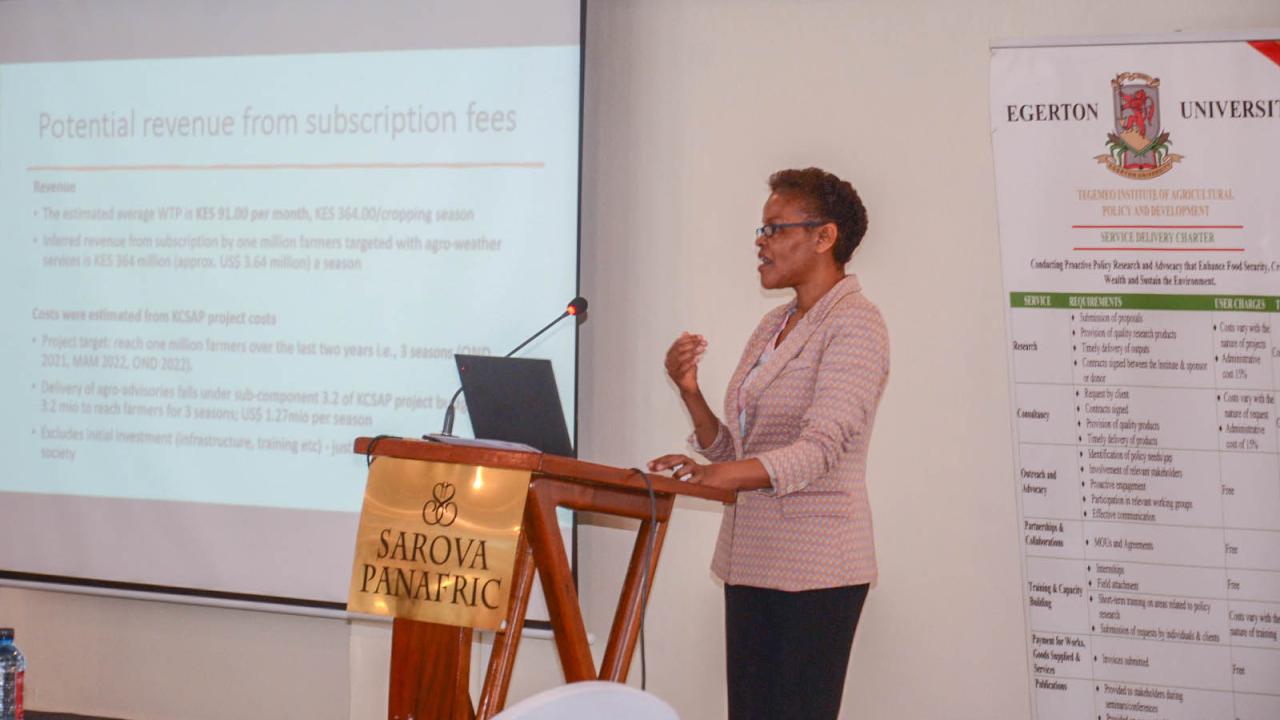
New Findings on Digital Agro-Weather Advisories in High ‘Climate Risk’ Areas of Kenya
Quick Summary
- New findings from the Feed the Future ALL-IN-funded study, led by the Tegemeo Institute of Agricultural Policy & Development at Egerton University, show there is demand for agro-weather advisories among smallholder farmers in Kenya.
Small-scale agriculture in Kenya is mostly rain-fed, making farmers vulnerable to the impacts of weather variability and climate change. According to the World Bank, climate change will likely have major implications for maize production in Kenya, with losses estimated at US$100–200 million annually by 2050. Similarly, other crops and livestock will suffer heavy losses with serious implications as a result of climate change.
This points to an urgent need to avail scalable adaptation tools for small-scale farmers who are most vulnerable to climate change. Several barriers may, however, keep farmers, particularly women and other vulnerable groups, from adopting and benefiting from climate adaptation strategies that reduce exposure to climate-related risks.
Climate information services have become an important tool for mitigation of the impact of risks associated with climate change and weather variability. Smallholder farmers’ access to timely, affordable, and accurate agro-weather advisories is key to empowering farmers’ decision-making for increased adaptive capacity, greater agricultural productivity, household income, and food security.
New findings from the Feed the Future ALL-IN-funded study, led by the Tegemeo Institute of Agricultural Policy & Development at Egerton University, show there is demand for agro-weather advisories among smallholder farmers in Kenya. Further, findings also demonstrate that scale of farming, engagement in farming as a business, and self-employment drive farmers’ demand for the weather-related advisories.
“From the study, we have also established how much farmers would be willing to pay on average and shown that forty nine percent (49%) of the farmers in the study sample were unwilling to pay for the advisories, especially farmers with smaller acreage,” says Dr. Mercy Kamau, the project’s Principal Investigator.
Mercy adds: “A purely privatised agro-weather service is, therefore, likely to be non-inclusive. Hence, a pricing mechanism that differentiates farmers, for example, by farm size, or a subsidy for smallholder farmers, would ensure all farmers benefit from the digital weather information service, irrespective of their ability to pay.”
Recommendation by this ALL-IN research team is that the goal of any agency that provides or contributes to agro-weather advisories should be to reach as many farmers as possible since the costs of producing weather information is the same, whether producing for few or many farmers.
This study is part of a bigger study which was designed by the team from Tegemeo Institute, to evaluate the impact of climate information services, one of the interventions of a five-year (2017-2022) Government of Kenya Climate Smart Agriculture Project (KCSAP). KCSAP is jointly supported by the World Bank and aimed at increasing smallholder farmers’ access to agro-weather advisories and market information, and adoption of climate smart technologies, innovations and management practices.
“Through this study, we sought to assess access to and the impact of these agro-weather advisories on productivity and resilience in households, women and other vulnerable groups,” says Mercy.
“Climate-change remains a serious threat to food security and rural livelihoods in Kenya and across Africa. Studies like these are critical as they provide key evidence needed to design tools that help smallholder farmers thrive amidst this unprecedented threat,” says Dr. David Sarfo Ameyaw, President and CEO of the International Centre for Evaluation and Development (ICED).
ALL-IN is a development research project funding various research across five African countries (Kenya, Uganda, Malawi, Ethiopia, Ghana, and Nigeria). ALL-IN is implemented by the Feed the Future Innovation Lab for Markets, Risk & Resilience in collaboration with ICED.
For more information, please visit the International Centre for Evaluation and Development website.
